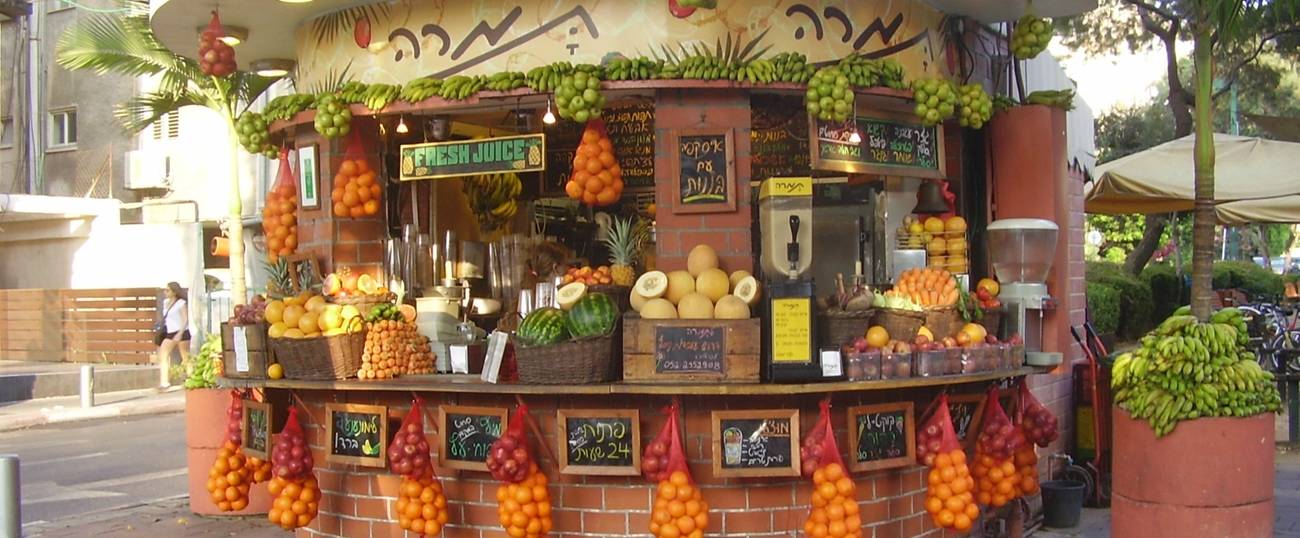Travel + Leisure Just Selected Tel Aviv As One of Its Top 50 Destinations of 2018. Here Are Some Local Spots They Won’t Tell You About.
Fancy hotels are nice. Hummus and juice are nicer.




For the first time ever, Travel+Leisure, the magazine for people with inexplicable reserves of time and money, has selected Tel Aviv as one of its top 50 destinations for the coming year.
“This month,” the magazine wrote, “the Setai opens in a former Ottoman prison; a new W Hotel housed in a 19th-century former convent and pilgrims’ hospice is scheduled to open in March. It’s just the latest in a growing list of upscale hotels, restaurants, and boutiques to arrive among the winding streets of this former fishing village. Jaffa’s once-shabby flea market is now populated by a number of high-end antique dealerships, which sit alongside trendy cafés and bars—many offering live music into the night.”
Now look here: The Setai is nice, and I’ve nothing against trendy cafés. But as those of us who were fortunate enough to grow up in Tel Aviv know, the city’s charms have nothing to do with luxury. If you follow the fancy magazine’s good advice and travel to Tel Aviv soonest, then, here are five real spots you absolutely have to visit:
HaMinzar: Step into this iconic bar, and you might as well be in a Polish-Jewish tavern 150 years ago. The food is terrific and decidedly eastern European, with smoked meats and herring and chopped liver drenched in goose fat. The clientele is just as elemental: There aren’t any start-up nation types here, just crotchety bohemians of all ages seeking shelter from a world gone mad in massive pints of cold beer. This is the sort of joint you dream about stumbling into in Berlin or Prague, only the food is better and the people delightfully less polite.
Haben Shel Ha’Suri Hummus: Ha’Suri, or the Syrian, was probably Tel Aviv’s most legendary hummus master. He’d start cooking at dawn, open his shop early enough for day laborers to swing by for breakfast, and make precisely one big pot of hummus, which would usually run out well before noon. He would treat his customers with churlishness that made Seinfeld’s famous Soup Nazi seem patient and understanding, but no one minded: The hummus was divine. Then, in 2014, and giving no explanation, the Syrian, whose real name is Zaki Mashanya, closed up shop. Eaters everywhere mourned their loss, but they didn’t have to weep for long because by the end of that same year, Mashanya’s son, Avi, opened a place of his own, serving the very same delights. Walk in, ask for a Komplet, and commune with the angels.
Eretz Israel Museum: With all due respect to Jerusalem’s Israel Museum, Tel Aviv’s Eretz Israel museum is nimbler, cooler, and endlessly more interesting. You won’t find masterpieces like the Dead Sea Scrolls here, but you can revel at a rich variety of objects documenting Jewish life through the ages, from a reconstructed home showing domestic life in biblical times to impressive collections of coins and stamps and textiles. As is befitting a museum dedicated to material culture, the gift shop is unparalleled, featuring unique works by up-and-coming Israeli artists and jewelers.
Folk Dancing on the Beach: I admit, I don’t get the whole Israeli folk dancing thing. But hundreds of Israelis apparently do, which is why they congregate in Tel Aviv’s Gordon Beach every Saturday morning and kick it like it’s 1929. You would think that such a decidedly old-fashioned pursuit would attract decidedly old-fashioned people. But you’d be wrong: It’s not uncommon to see the young and the tragically hip doing the Yemenite step hand in hand with elderly immigrants from Russia, a celebration of the diversity this city’s all about.
Tamara’s Juice Kiosk: Stroll down the charming David Ben Gurion Boulevard—you might want to visit the Old Man’s house, which houses his wondrous library—and you’ll see a round kiosk swarming with people. It’s Tamara, and it sells very good and very fresh juices. That’s it. Get your coconut-pineapple-orange, sit on a bench, and enjoy the weather and the company and life. It’s the essence of this magical city.
Liel Leibovitz is editor-at-large for Tablet Magazine and a host of its weekly culture podcast Unorthodox and daily Talmud podcast Take One. He is the editor of Zionism: The Tablet Guide.